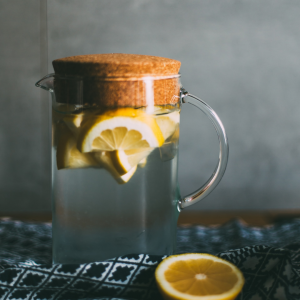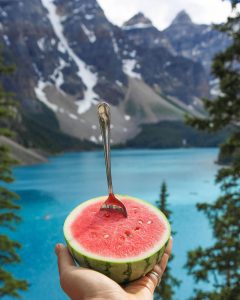We hear it time and time again. “Drink eight eight-ounces glasses of water a day.” When we think of drinking water, we tend to focus solely on keeping hydrated. What you may not realize, however, is that hydration and your ability to sleep truly go hand-in-hand.
Let’s take a look at how dehydration can affect your sleep, and how drinking water throughout the day can help you get the rest you need.
Does dehydration really affect sleep?
Yes, dehydration absolutely affects sleep. Going to bed without enough water consumption during waking hours can cause a variety of issues during the night that either keeps you up, or prohibits quality sleep. When you go to bed without enough water in your system, your mouth and nasal passages are likely going to be dried up. This can cause snoring, which not only may cause you to wake up in the middle of the night, you may keep your partner up if your snoring is loud and persistent (and we wouldn’t want that, would we).
Dehydration can also lead to annoying leg cramps that can keep you awake, or wake you up in the middle of your sleep. Have you ever had a Charlie horse in the middle of the night? They’re the worst!
If you suffer from insomnia, chronic dehydration will only make the issue worse. Your body creates melatonin towards the end of the day to get you to feel tired and ready for rest. Your body depends on essential amino acids to produce melatonin. When you are chronically dehydrated, you have a lower number of these amino acids, which means lower melatonin levels.
A vicious cycle
As you would expect, your body does lose some water while you sleep. This is normal. In fact, you may lose up to one liter of water each night. If you snore, the loss of water will be on the higher end. If you don’t get great sleep, however, it can be even worse.
While dehydration can lead to a lack of quality sleep, the cruel reality is that a lack of sleep can lead to further dehydration, which affects your day. As you’re probably aware, your body retains water consumed throughout the day, so you don’t have to constantly drink every waking minute.
Your body works to retain water while you sleep as well. While you are sleeping, your body releases a hormone known as Vasopressin. In simple terms, this hormone controls your body’s water balance both day and night. In order to hold onto water while you sleep, your body will release the hormone both at the beginning of your sleep, and later on in the sleep cycle.
Research has shown that those who slept six hours or less each night can miss the window when additional hormones are released, which throws off the body’s ability to control hydration. In fact, the results of the research indicated that those who had very little sleep were 16-59% more likely to be dehydrated compared to those who got eight hours of sleep a night.
A lack of water may hurt your back
Do you suffer from back pain when you feel dehydrated? When you do, does this pain keep you up at night? You may be surprised to learn that dehydration can be a cause of back pain (it certainly surprised us). Back pain from dehydration occurs within your spine. A disc rests in between every two vertebrae to provide cushioning, shock absorption and mobility to your spine.
You can think of these discs to be like a jelly donut. The outer ring of the disc tends to be strong, while the insides are a softer, jelly-like substance. This substance is made up primarily of the water within your body and provides the cushioning. As you go about your day, the water inside these discs starts to leak out. If you’re well hydrated, gravity will pull water down your spine, allowing the discs to rehydrate. If you’re dehydrated, however, the discs in your spine will begin to shrink.
Once the disc has shrunk, the weight begins to fall on the outer ring of your disc. The disc will then start to collapse, and place pressure on sensitive nerves that causes back pain. A dehydrated disc can also lead to a herniated disc, since swelling can occur and exert enough pressure.

The hydrating game plan
After reading the above, you may think that you can just simply drink a lot of water before going to bed, and your problems would be solved. Sounds simple enough, right? Well, not so fast. The key to being hydrated enough for better sleep is a process that needs to occur throughout the day.
When you first wake up to start your day, try reaching for a glass of water instead of a coffee. Doing so may help create a new habit, and helps get the first glass out of the way. Try drinking the water near a window so you can get exposure to sunlight, as it will stop the production of melatonin and help clear the foggy feeling in your head.
If you drink coffee in the morning (really, who doesn’t), wait 90 minutes after you get up. You want to have your first glass of water first. If you feel like you need a little more caffeine to get you through the day, make the 2 PM pick-me-up your last cup for the day. Stopping at 2 will help prevent poor sleep quality effects you would feel after finishing your coffee.
If you plan on going out with friends or having a drink with dinner, make sure you stop drinking at least four hours before going to bed. And every time you have an alcoholic drink, have a glass of water along with it. So if you have three alcoholic drinks, have three glasses of water. Alcohol is a diuretic, which causes the body to remove essential fluids from the blood faster than other liquids, causing you to become dehydrated quickly.
And of course, you will need to stop drinking water at some point before going to bed. You should stop drinking water about two hours before going to sleep. While keeping hydrated is important, having too much water before going to bed is counter-productive, as you will be getting up throughout the night to use the bathroom.
Making water less dull
Now we know that drinking water is important. But sometimes, we tend to stop drinking it because, let’s be honest, drinking a beverage with little to no taste can become boring. Luckily, there are ways to take a plain glass of water and add a refreshing taste to it!
A common addition to water is lemon. Adding lemon juice not only introduces flavor to the water, but it also carries unique additional benefits. Lemons contain potassium, calcium and magnesium, which helps produce energy. Lemons also have electrolytes that help hydrate tissues in your body and get the nasty toxins out at the same time. Lemons have also been shown to help reduce as they help add potassium into your bloodstream, as studies have shown that a lack of potassium can lead to depression and anxiety. And finally, lemons have a high concentration of negative ions, which increases how much oxygen goes to your brain, helping you feel more alert!

Not a fan of lemons? No problem! Try infusing your water with fruit! Take some sliced fruit and add it to a large jug filled with water. Place the jug into the fridge overnight to let the flavors of the fruit infuse with the water. If you’re in a pinch, or just don’t want to wait too long, you can add a splash of unsweetened juices (like cranberry juice) or a flavor pack to the water for that extra bit of taste. For an extra kick of vitamins in the morning, take any water left after boiling vegetables and chill overnight.
Eat your water
Are you to the point that when you see a glass of water, it makes you shiver in disgust? Fret not! There are things you can eat that are not only considered healthy, but are actually quite high in water content, helping you get the hydration you need! Here are some of these foods, and the benefits they have to your overall health:
- Watermelon: As the name would suggest, watermelon is one of the best foods you can have for hydration. This fruit is made up of 92% water, and one cup of watermelon has over half a cup of water! Watermelon also contains key nutrients, and is rich in the antioxidant lycopene, which has been shown to reduce oxidative damage to your cells, which can cause heart disease and diabetes.
- Strawberries: Did you know that water attributes 91% of a strawberry’s weight? On top of helping with hydration levels, having strawberries regularly can help reduce inflammation, which can protect against Alzheimer’s and various types of cancer.
- Lettuce: If you love salads, you’re in luck! A cup of lettuce contains over a quarter cup of water, and 1 gram of fiber. Each cup also contains 5% of the daily needs for folate, which is important for pregnant women. In addition to being used for salads, you can use lettuce to replace a traditional burger bun or use it instead of a tortilla for wraps.
- Celery: This vegetable is mostly water, giving you close to half a cup of water for each one cup serving. Celery is also high in vitamin K and potassium, which can help prevent heart disease, certain cancers, and bone-related diseases.













